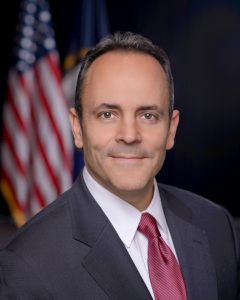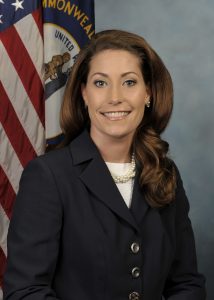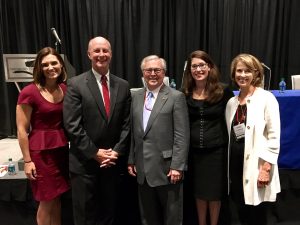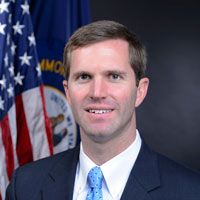 Gov. Matt Bevin signed a budget reduction today last week, meeting the Constitutional mandate that the Commonwealth of Kentucky end the fiscal year with a balanced budget. General Fund revenue receipts fell short of budgeted amounts by $138.5 million, requiring today’s action.
Gov. Matt Bevin signed a budget reduction today last week, meeting the Constitutional mandate that the Commonwealth of Kentucky end the fiscal year with a balanced budget. General Fund revenue receipts fell short of budgeted amounts by $138.5 million, requiring today’s action.
The Governor’s veto of a portion of the budget bill allowed an additional $5 million in lottery receipts to be dedicated to scholarships and not lapse to the General Fund. In addition, a lower than expected lapse of debt service raised the total resource requirements to meet the shortfall to $152.2 million.
“This year’s budget shortfall validates the need for conservative spending plans, and it dramatically underscores the critical need for fixing Kentucky’s broken pension systems and modernizing the state’s tax code,” said Gov. Bevin. “A solid financial foundation is essential before the Commonwealth can reach its full potential.”
The actions taken today to close the fiscal year 2017 budget gap included a combination of General Fund appropriation reductions and fund transfers from restricted funds. Also included were one-time savings in Medicaid costs due to the favorable renegotiation of contracts with the managed care organizations (MCOs) and lower than expected pharmacy costs. The Governor’s order to balance the budget does not include any reduction to the state’s Budget Reserve Trust Fund.
“We are expecting an ongoing challenge with revenues in the next fiscal year and the next biennium,” stated John Chilton, the State Budget Director. “Today’s actions by the Governor responsibly preserves the Rainy Day Fund as we prepare for the tight fiscal environment in front of us.”
In anticipation of the budget shortfall, the Office of the State Budget Director directed the Governor’s Cabinet Secretaries to identify a reduction in their General Fund expenditures. These reductions, plus reductions by the Legislative and Judicial branches, amounted to $59.3 million. Fund transfers of various excess restricted funds totaled $77.3 million. General fund lapses and fund transfers in excess of budgeted amounts accounts for the remaining $15.5 million of the total $152.2 million shortfall. Programs funded through coal severance revenues are automatically adjusted when receipts fall short of projections. That resulted in a $17 million reduction in money going to the Local Government Economic Assistance Fund.
The Medicaid portion of the original budget was based on MCO contract rates in effect in 2015. Prior to Governor Bevin taking office, Kentucky ranked number 1 in the nation in profits earned by MCO providers; their profits were more than 4 times the national average for all MCOs. As part of Governor Bevin’s Medicaid transformation, the administration renegotiated these contracts resulting in lower than budgeted cost.
Final fiscal year 2017 General Fund receipts were 1.3 percent less than the official estimate. If the fiscal year 2018 revenue shortfall approximates this year’s amount, significant additional spending reductions will be needed to balance the budget in fiscal year 2018. The current balance of the Budget Reserve Trust Fund, $150.5 million, remains unaffected by today’s action.

Photo: Secretary of State website
Kentucky Secretary of State Alison Lundergan Grimes on Monday led a unanimous group of her colleagues in reaffirming states’ constitutional rights to administer federal, state, and local elections.
The members of the National Association of Secretaries of State unanimously passed a bipartisan resolution in response to a letter they received from the Presidential Commission on Election Integrity. The resolution reiterates the responsibilities of states to run elections and the secretaries’ collective “commitment to strengthening election cybersecurity and processes, and increasing voter participation
The letter from the presidential commission requested secretaries turn over sensitive voter information, including party affiliation, voting history, and Social Security numbers. More than 40 states have said they will not comply fully with the request.
After many secretaries individually expressed concerns about the request potentially jeopardizing voter privacy and infringing on states’ ability to run elections, Grimes worked with a group of her colleagues at the association’s summer conference to put forth their concerns collectively.
“We each devoutly believe in the Constitutional responsibility states have in running elections, including maintaining voter registration,” Grimes said. “As chief election officials, we are resolute in our shared obligation to ensure our elections are free and fair and engender the trust of our citizens. That means reaffirming the rights of our states to run our elections and protecting voters from unwarranted risks to their personal, sensitive information.”
The National Association of Secretaries of State is the nation’s oldest, nonpartisan professional organization for public officials. Membership is open to the 50 states, the District of Columbia and all U.S. Territories. Forty of its members are their states’ chief election officials.
 Insurance carriers have submitted proposed rates to the Department of Insurance (DOI) for 2018 in Kentucky’s individual and small group markets. In a continuing trend tied to market forces, an aging population, and systemic instability and uncertainty injected by the failure of Obamacare, the proposed rates reflect substantial year-over-year increases ranging from 6.5% to 47.7% depending on the plan. In addition to increased rates, preliminary filings suggest Kentuckians will have limited options on the healthcare exchange. In some counties, there will be only one option for individual coverage and no exchange offerings will be available in the small group market.
Insurance carriers have submitted proposed rates to the Department of Insurance (DOI) for 2018 in Kentucky’s individual and small group markets. In a continuing trend tied to market forces, an aging population, and systemic instability and uncertainty injected by the failure of Obamacare, the proposed rates reflect substantial year-over-year increases ranging from 6.5% to 47.7% depending on the plan. In addition to increased rates, preliminary filings suggest Kentuckians will have limited options on the healthcare exchange. In some counties, there will be only one option for individual coverage and no exchange offerings will be available in the small group market.
“The health insurance marketplace has been ripe with uncertainty and instability since the implementation of Obamacare,” said DOI Commissioner Nancy Atkins. “Year-after-year, Kentuckians are experiencing the fallout from bad policy, and the rate increases reflected in this year’s filings are, unfortunately, commonplace for most states.”
In an effort to reduce the magnitude of these proposed rate increases, DOI exercised its available flexibility within federal mandates to extend the submission date for initial rate filings on two separate occasions. These extensions permitted carriers additional time to fully evaluate the 2018 market. In addition, DOI proactively provided insurers with marketplace information specific to Kentucky.
“DOI has emphasized to carriers that the best possible outcomes for Kentucky consumers must be achieved,” added Atkins. “Obamacare’s failure at the federal level combined with the collapse of the Kentucky Health Cooperative under the Beshear Administration placed a substantial strain on the state’s entire healthcare matrix which continues to impact the current stability of the marketplace.”
DOI cautions the filings are preliminary and subject to change. Experienced DOI health analysts and actuaries will closely evaluate the rate request applications before rates are finalized on or before August 16, 2017. Although rate requests are generally indicative of rate increases for consumers, individual premiums will depend on a variety of factors, including age, smoking habits, and geographic location. Open enrollment for plan year 2018 begins November 1, 2017.
The preliminary 2018 rate filings are available online on the Kentucky Department of Insurance website at http://insurance.ky.gov/ratefil/default.aspx.
The Kentucky Department of Insurance regulates the Commonwealth’s insurance market, licenses agents and other insurance professionals, monitors the financial condition of companies, educates consumers to make wise choices, and ensures Kentuckians are treated fairly in the marketplace. To learn more about DOI, visit http://insurance.ky.gov/.
 Secretary of State Alison Lundergan Grimes on Thursday led a robust discussion on the trust Americans place in courts and media at the Kentucky Bar Association convention. Grimes’ panel included Kentucky Supreme Court Chief Justice John D. Minton, Jr., retired federal Judge Jennifer B. Coffman, WHAS host Terry Meiners, and television commentator Krystal Ball.
Secretary of State Alison Lundergan Grimes on Thursday led a robust discussion on the trust Americans place in courts and media at the Kentucky Bar Association convention. Grimes’ panel included Kentucky Supreme Court Chief Justice John D. Minton, Jr., retired federal Judge Jennifer B. Coffman, WHAS host Terry Meiners, and television commentator Krystal Ball.
“Polling increasingly shows a disturbing and declining level of trust among Americans for public institutions like the judiciary and media,” said Grimes. “Earlier this year, my office released our Civic Health Index, a study revealing Kentucky ranks 48th in the nation for trust in media and public institutions. Our discussion today was important to identify causes and solutions for stemming the tide of distrust.”
Grimes noted that the proliferation of information sources make it easier than ever for citizens to seek news and commentary that affirms their political beliefs rather than informs them.
“If you hear something you don’t like in the media, or disagree with something from the courts, people now say, ‘They’re on the other team and the enemy’,” said Ball. “Some politicians have seized on that sentiment and use it to divide people.”
“The media is in a place to poke and ask questions and to create a pendulum of ideas. It is incumbent on the media to open the gates to keep the information flowing to the people. It’s the only way we’ll flourish,” said Meiners.
Minton, who has been traveling Kentucky discussing ways to strengthen citizens’ regard for the American judiciary, said minorities are more likely than not to have a distrust of the court system.
“There’s a firmly-held belief in the African-American community that courts are not fair to them. It raises the point that [the judiciary has] a trust deficit with certain segments of the population that we need to address,” said Minton.
Polling shows Americans have more confidence in their state courts than federal courts. Coffman said that’s due to people being more connected to their local judicial officials.
“State court judges are people who are our neighbors, maybe you go to church with them. If you put a human face on something, you are much more likely to trust it,” said Coffman. “Federal courts are reviewed as a little remote.”
The Civic Health Index showed only 46.5 percent of Kentuckians say they are a great deal or somewhat confident in the media. Ball said the media is partly to blame.
“[The media] has in some ways not done ourselves any favors. 2016 was the most substance-free election in terms of the coverage,” Ball said. “When people hear the rhetoric from politicians and then they turn on the TV and see the shouting matches, they believe the media isn’t working for them.”
“It’s a successful strategy [to say the media is fake]. But it’s cyclical. It’ll wear itself out,” said Meiners.
The panel agreed that media is instrumental in making sure the public understands the court system and how it works.
“When I came to the court, you had a press corps with a lot of knowledge about government and the courts. Now, most [reporters] don’t speak the language of the judiciary, and we have to teach them,” said Minton.
Coffman said most media approaches its reporting with trust in the judiciary: “In responsible media sources, you have an underlying belief in the rule of law.”
Grimes and the panel reiterated the important duty media and judiciary have in a healthy democracy.
“We all have a role to play in building up trust in our public institutions,” said Grimes.
Read more about Kentucky’s Civic Health Index at sos.ky.gov.
 Attorney General Andy Beshear announced yesterday that he is demanding Gov. Matt Bevin rescind a June 2 executive order dissolving and reorganizing numerous state education boards.
Attorney General Andy Beshear announced yesterday that he is demanding Gov. Matt Bevin rescind a June 2 executive order dissolving and reorganizing numerous state education boards.
Failure to do so, Beshear said, would result in legal action by the AG’s office challenging last week’s unlawful and unconstitutional move by the governor, which mirrors conduct taken by the governor against the boards of the University of Louisville and the Kentucky Retirement Systems.
“The governor does not have ‘absolute authority’ over state boards,” Beshear said. “He cannot ignore laws passed by the General Assembly that create independent boards, lay out their structure and set mandatory terms for their members. Put simply, he cannot rewrite laws he does not like through executive orders.”
Beshear said his duty is to the law and to enforce Kentucky’s system of checks and balances. The power claimed by the governor to dissolve or reorganize any state board eviscerates all checks and balances and would effectively give the governor control over all decisions of every state board, including the Registry for Election Finance or the Executive Branch Ethics Commission.
“I’m especially troubled that the governor has hit Kentucky’s education system with yet another executive overreach,” Beshear said.
Last year, Beshear challenged the governor’s illegal and wrongful withholding of $18 million from Kentucky’s public colleges and universities. The Kentucky Supreme Court ruled in September 2016 that the money was unlawfully withheld, and stated in its decision that the job of the attorney general is “to vindicate the public rights of the people of the Commonwealth.”
Beshear’s request to the governor to rescind the June 2 executive order is not about charter schools nor is it a challenge to Senate Bill 1, he said.
In fact, Beshear said the governor’s board reorganization last week ignores and rewrites portions of Senate Bill 1.
“Gov. Bevin did not veto SB 1,” Beshear said. “But now he wants to substitute his judgment for that of the General Assembly and singlehandedly change the law.”
In the June 2 executive order, the governor dissolved four statutorily created boards, removing more than 35 members before the end of their mandatory term. He then created four new boards with the same names and duties but allowing himself to appoint all new members and the chair.
“We have seen this type of illegal behavior by the governor time and time again,” Beshear said. “My job as attorney general is to enforce the Constitution, to maintain the separation of powers and to ensure no branch of government exceeds the powers that we the people granted to it. I’m hopeful the governor will rescind his executive order and allow the education boards to properly operate under the law – without his undue influence.”
 Five members of the Louisville Metro Council are seeking public comment on the proposed 2017 -2018 Capital and Operating Budgets at a special community meeting on Monday, May 22nd at the Louisville Urban League.
Five members of the Louisville Metro Council are seeking public comment on the proposed 2017 -2018 Capital and Operating Budgets at a special community meeting on Monday, May 22nd at the Louisville Urban League.
Councilmembers Jessica Green (D-1), Mary C. Woolridge (D-3), Barbara Sexton Smith (D-4), Cheri Bryant Hamilton (D-5), and David James (D-6) are inviting their constituents to come out and share their thoughts on what should be in the upcoming budget.
“It is important to me that the citizens of District 1 have a voice in this budget process because for far too long, they have felt ignored and left out,” says Green. “I want everyone to have an understanding not only of what the process is, but what is actually in the budget in order to be able to advocate for what citizens in my community want and need.
“Everyone knows there are not unlimited resources so we invite the community to help us set priorities for funding that improves the quality of life of our residents,” says Hamilton.
“We want to reach out to everyone. It is important that we hear from folks in the neighborhoods, homeowners, and business owners.” says Sexton Smith. “We have to rely on the public to give a perspective we may not be aware of when it comes to priorities and we want to make it easier for them to participate and ask questions.”
The Metro Council Budget Committee has already begun its hearings on the budget and will spend the months of May and June reviewing Metro Government needs before a vote on June 22nd.
The Budget public meeting will be held at the Louisville Urban League, 1535 W. Broadway from 6:30pm to 8:30pm.
“We need public input into the 2017-2018 Louisville Metro Recommended Budget from the community and I am happy to make the effort to hear from taxpayers. I know it is not always easy to come downtown to City Hall due to parking constraints,” says Woolridge. “I hope everyone will attend this community meeting regarding Mayor Greg Fischer‘s Budget. Tell us what you would like to see in this Budget.”
“Bringing the budget public input process from City Hall to the community to hear what the citizens have to say about the budget is a vital step in this process,” says James. “It’s your money and we need to know how you feel about how we are spending it.”
 Develop Louisville will hold nine open house forums for the public to view the work completed to date on the Comprehensive Plan update and provide feedback. Develop Louisville encourages all residents to attend the forums, particularly those who have not yet participated in the Comprehensive Plan update process
Develop Louisville will hold nine open house forums for the public to view the work completed to date on the Comprehensive Plan update and provide feedback. Develop Louisville encourages all residents to attend the forums, particularly those who have not yet participated in the Comprehensive Plan update process
“The Comprehensive Plan will shape our city’s growth for the next 20 years, therefore we are soliciting broad and diverse input to help create the plan,” Mayor Greg Fischer said. “I encourage residents from all neighborhoods of our city to attend a forum and share your thoughts on the future of our community.”
Forum locations, dates and times are as follows:
- Monday, May 22: Main Library (301 York Street) from 4-8 p.m.
- Wednesday, May 24: Southwest Library (9725 Dixie Highway) from 6-8 p.m.
- Tuesday, May 30: Bowman Field (2815 Taylorsville Road) from 6-8 p.m.
- Wednesday, May 31: Sawyer Hayes Community Center (2201 Lakeland Road) from 6-8 p.m.
- Saturday, June 3: The Table (1800 Portland Avenue) from 9-11 a.m.
- Monday, June 5: Fern Creek High School (9115 Fern Creek Road) from 6-8 p.m.
- Tuesday, June 6: The Jeffersonian (10617 Taylorsville Road) from 6-8 p.m.
- Wednesday, June 7: Shively Community Center (1902 Park Rd) from 6-8 p.m.
- Saturday, June 17: Sir Friendly C Community Center (822 S 15th Street) from 1-4 p.m.
The Comprehensive Plan will guide the growth of the community for the next 20 years and serves as the basis for land use and transportation policies. This update will build upon the success of Cornerstone 2020, the current comprehensive plan, and will be informed by recent planning initiatives, including Vision Louisville, Move Louisville, Healthy Louisville 2020, and Sustain Louisville.
To date, the Comprehensive Plan team has held or been a part of over 100 meetings and events to gather input from the community. Examples of outreach include meetings with an Advisory Committee, work groups, suburban communities, neighborhood groups and business organizations.
For information on the Comprehensive Plan, please visit https://louisvilleky.gov/government/planning-design/comprehensive-plan
 Weather
Weather Traffic
Traffic @LouisvilleDispatch
@LouisvilleDispatch @LouisvilleDisp
@LouisvilleDisp Subscribe
Subscribe